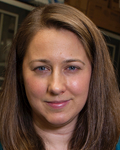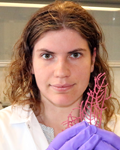 Loes van Dam, Ph.D. student, received the 2018 Outstanding Student Poster and PICO award from European Geosciences Union. A PICO (Presenting Interactive Content) is a new format for scientific conferences, combining a short oral presentation with an interactive touchscreen presentation. Her winning presentation focused on modelling fluid dynamics in the Earth’s mantle, specifically beneath mid-ocean ridges.
Loes van Dam, Ph.D. student, received the 2018 Outstanding Student Poster and PICO award from European Geosciences Union. A PICO (Presenting Interactive Content) is a new format for scientific conferences, combining a short oral presentation with an interactive touchscreen presentation. Her winning presentation focused on modelling fluid dynamics in the Earth’s mantle, specifically beneath mid-ocean ridges.
 Assistant Professor Roxanne Beinart was named a 2019 Simons Foundation Early Career Investigator in Marine Microbial Ecology and Evolution. The three-year award is intended to help launch the careers of outstanding investigators in this area. Dr. Beinart will study the patterns of specificity and maintenance in microbe-microbe partnerships.
Assistant Professor Roxanne Beinart was named a 2019 Simons Foundation Early Career Investigator in Marine Microbial Ecology and Evolution. The three-year award is intended to help launch the careers of outstanding investigators in this area. Dr. Beinart will study the patterns of specificity and maintenance in microbe-microbe partnerships.
 Carrie McDonough (Ph.D. 2017) received the Outstanding Doctoral Dissertation Award from the Association of Environmental Engineering and Science Professors. This award is given annually to recognize an outstanding doctoral dissertation that contributes to the advancement of environmental science and engineering. Dr. McDonough’s dissertation focused on organophosphate esters, which are widely used as flame retardants, and their effect on remote regions like the Arctic.
Carrie McDonough (Ph.D. 2017) received the Outstanding Doctoral Dissertation Award from the Association of Environmental Engineering and Science Professors. This award is given annually to recognize an outstanding doctoral dissertation that contributes to the advancement of environmental science and engineering. Dr. McDonough’s dissertation focused on organophosphate esters, which are widely used as flame retardants, and their effect on remote regions like the Arctic.
 Ph.D. student Jacob Strock was awarded a NASA fellowship through the Rhode Island Space Grant Consortium. Graduate fellowships through this program are intended for students with research strongly applicable to current NASA missions. The fellowship will fund Strock for a year as a Ph.D. student to investigate the role of dynamic temperature on the ecology of phytoplankton.
Ph.D. student Jacob Strock was awarded a NASA fellowship through the Rhode Island Space Grant Consortium. Graduate fellowships through this program are intended for students with research strongly applicable to current NASA missions. The fellowship will fund Strock for a year as a Ph.D. student to investigate the role of dynamic temperature on the ecology of phytoplankton.
M. Lubetkin, M.S. student, was an Outstanding Student Presentation Award winner for their work at the 2018 American Geophysical Union Fall Meeting. Their presentation was titled “Evidence of Simultaneous Effusive and Explosive Activity During the 1993 Submarine Eruption West of Socorro Island, Mexico.”
 Colin Jones, Ph.D. student, won one of four funding opportunities through the Schlanger Ocean Drilling Fellowship Program. Jones’s proposal, “Oceanographic controls on mid-Holocene nutrient consumption at Palmer Deep, West Antarctic Peninsula,” was funded because of its innovative and imaginative use of scientific ocean drilling data.
Colin Jones, Ph.D. student, won one of four funding opportunities through the Schlanger Ocean Drilling Fellowship Program. Jones’s proposal, “Oceanographic controls on mid-Holocene nutrient consumption at Palmer Deep, West Antarctic Peninsula,” was funded because of its innovative and imaginative use of scientific ocean drilling data.
 Catherine (Catrina) Nowakowski, Ph.D. student, was awarded a fellowship through the National Science Foundation Graduate Research Fellowship Program. This three-year program is intended to support future knowledge experts who can contribute significantly to research, teaching, and innovations in science and engineering. Nowakoski’s research will focus on the past and future of the Gulf of Maine food web.
Catherine (Catrina) Nowakowski, Ph.D. student, was awarded a fellowship through the National Science Foundation Graduate Research Fellowship Program. This three-year program is intended to support future knowledge experts who can contribute significantly to research, teaching, and innovations in science and engineering. Nowakoski’s research will focus on the past and future of the Gulf of Maine food web.
 Ph.D. student Benjamin Grassian received a Link Foundation Ocean Engineering and Instrumen-tation Fellowship for the 2019-2020 aca-demic year. Working with Professor Chris Roman, Ben will use a new towed profiling vehicle, called a Wire Flyer, that was integrated with a dual frequency fisheries echosounder to gather and couple acoustic and environmental data to examine the linkages between fine-scale hydrography and animal habits.
Ph.D. student Benjamin Grassian received a Link Foundation Ocean Engineering and Instrumen-tation Fellowship for the 2019-2020 aca-demic year. Working with Professor Chris Roman, Ben will use a new towed profiling vehicle, called a Wire Flyer, that was integrated with a dual frequency fisheries echosounder to gather and couple acoustic and environmental data to examine the linkages between fine-scale hydrography and animal habits.
Elizabeth Harvey, (Ph.D. 2013) won a 2019 Sloan Research Fellowship, a prestigious early-career scholar award. Dr. Harvey is now an assistant professor at the Department of Marine Sciences at the University of Georgia where she works on plankton ecology.
Joseph Langan, Ph.D. student at GSO and an M.S. student in statistics at URI’s Department of Computer Science, was selected as one of seven 2018 NOAA Sea Grant and National Marine Fisheries Service Joint Fellowship recipients. His work during the fellowship will focus on improving projections of groundfish stock biomass to more sustainably manage New England’s fisheries. He also earned a Best Student Paper award for his presentation at the American Fisheries Society’s Fish Habitat Section 2018 annual meeting. Langan’s paper was titled “Characterizing Changing Ecosystem Phenology in Response to Climate in a Large Temperate Estuary.”
 Ph.D. student Anna Robuck was named a 2019 Switzer Fellow, which goes to highly talented graduate students whose studies are directed toward environmental improvement and who clearly demonstrate leadership in their field. “I am energized by the chance to learn from network members and to apply that knowledge towards environmental and public health concerns related to PFASs and other chemicals,” Robuck said.
Ph.D. student Anna Robuck was named a 2019 Switzer Fellow, which goes to highly talented graduate students whose studies are directed toward environmental improvement and who clearly demonstrate leadership in their field. “I am energized by the chance to learn from network members and to apply that knowledge towards environmental and public health concerns related to PFASs and other chemicals,” Robuck said.
